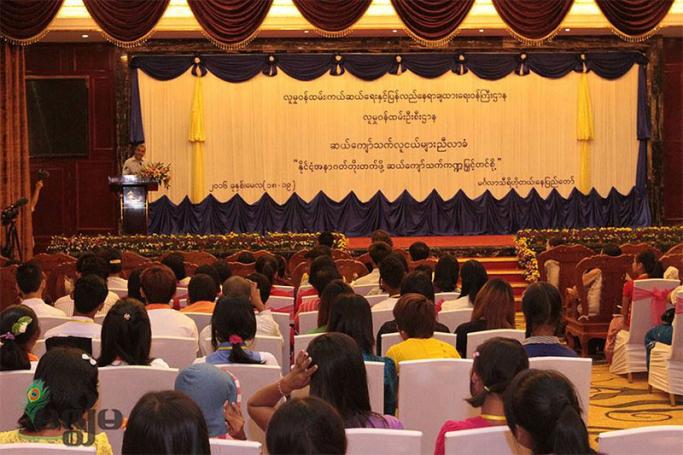More than 400 adolescents from across Myanmar gathered in Nay Pyi Taw on the 18 and 19 May for the first ever Adolescents Conference, organised by the Ministry of Social Welfare, Relief and Resettlement, ActionAid said in statement.
The event, supported by UNICEF, ActionAid and 15 other local and international organisations, and funded by the Australian National Committee for UNICEF, was an opportunity to discuss the range of issues faced by a diverse group of adolescent girls and boys from across the country. This discussion resulted in a list of recommendations for the national youth policy, currently under development by the Ministry of Social Welfare, Relief and Resettlement.
“Prosperous development will not happen unless we empower, engage and invest in adolescents, especially girls and groups that are marginalised by society”, affirmed Shihab Uddin Ahmad, ActionAid Myanmar Country Director. “Short but crucial, the transition to adulthood is such a beautiful and adventurous journey that shapes a person’s world view - they could create great social impact within a short period of time.” Without proper attention, adolescents are often subject to discrimination and negative attitudes due to social cultural norms or unequal power relations. Therefore, “to help them go through this journey towards adulthood, we need to address the challenges adolescents face and respond to their needs at the earliest stage of their lives”, added Shihab Uddin Ahmad.
The adolescents exchanged their experiences of carrying out social and civic engagement activities in their communities, placing a strong emphasis on inclusion of traditionally marginalized groups, such as adolescents with disabilities, as well as their contribution to building peace and strengthening the country’s unity. Drugs, education, human rights and gender equity, as well as employment opportunities and health were some of the themes that were discussed that affect almost 10 million adolescents in Myanmar.
“This first ever national conference made by and for adolescents, is the best way to hear directly from this creative, energetic and resourceful group, without any filter, about their concerns, their fears, their hopes and their dreams”, says Bertrand Bainvel, UNICEF Representative to Myanmar. “Adolescent girls and boys hold the key to Myanmar’s sustainable development. They have the power to help the society break away from repeated and protracted crises and conflicts. We need to address their rights today and invest in relevant policies, programmes and services so that they can be the next generation to carry on Myanmar’s development”.
At the end of the two-day initiative, a significant number of recommendations were presented by the participants to the Ministry of Social Welfare, Relief and Resettlement, parliamentarians, national and international organisations, and donors who attended the conference:
Sexual education should be provided at schools, which should also have space for sports, healthy food, clean water and sanitation facilities.
Adolescents need to access technical and vocational education and training, which will be useful to increase their job opportunities and prevent them from being exploited at work.
Education on environment protection and disaster risk reduction should be provided to adolescents, who should also access timely assistance when affected by a disaster.
Help centres should be established where adolescents can report cases of violence, exploitation and abuse.
To prevent drug abuse among adolescents, education should be provided at schools and communities, sports and other recreational activities created, laws reinforced, and livelihood alternatives provided to opium farmers.
Adolescents encourage the Tatmadaw and ethnic armed groups to build peace, to reconstruct damaged roads and bridges, to remove landmines, to provide health care services, and rehabilitate and develop conflict-affected areas.
These recommendations, which reflect adolescents’ key concerns and priorities, aim to guide the government and parliamentarians involved in the drafting of the national youth policy, which is a key component of the new Government’s 100 day plan, the statement said.
400 young girls and boys gather for first time ever to shape the national youth policy
20 May 2016
400 young girls and boys gather for first time ever to shape the national youth policy












